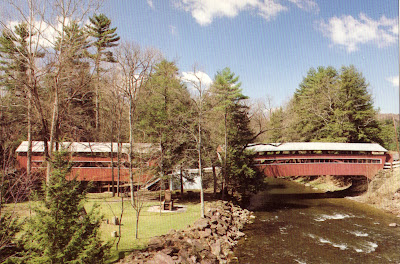I look back over the years to the visits to my father's
parents in Kingston,
N. Y. and I see the pattern of small but well-loved rituals we all observed.
My parents and I would start off from Shamokin, and later Pottsville, Pennsylvania
some time in the morning. We would load
up the Buick and make the trip of 160 odd miles in about four or five hours
including our lunch stop somewhere around Port Jervis, which lay between Pennsylvania and New
York. We would
arrive in Kingston
somewhere from mid to late afternoon, make our way to Pine Street, a shady residential street
several blocks off the main thoroughfare and finally pull up in front of a
large white clapboard house. This was 186 Pine Street.

Gram and Grand, as I called them, would be waiting at the
front door as I (always the first out of the car) hurtled up the front steps
and onto the porch to be hugged and kissed.
Gram, always carefully groomed and smelling faintly of some nice scent,
would be first. Then came Grand with a
bear hug and kisses, scratchy beard and all.
He smelled like cigars, bay rum and the faintest trace of good
bourbon. Greetings over, I would wiggle
past them and up the stairs to the bathroom.
This was always the same, freshly cleaned with a new bar of Yardley or
Castile soap in the dish. There was the
familiar little crewel rug on the floor in front of the sink, and fresh towels
on the rack. Back to the first floor,
this time sliding down the banister. My
parents and the luggage were now in the hall and I started on my tour of the
house to be sure that everything was there and where it ought to be.
To the left of the front door was the library with its
fireplace and white built-in bookshelves.
On these shelves were sets of Jane Austen, Edgar Allen Poe and Arthur
Conan Doyle. There were medical books
belonging to my doctor grandfather and sundry other volumes. My special books were "Ducky Daddles and
His Friends" written by my grandmother's cousin, Bertha Parker Hall, known
to all as Aunt Bet. She had written another book for slightly older children
called "Henny and Penny." This
had an inscription to my father on the flyleaf.
The library also had a slightly uncomfortable horsehair couch, easy
chairs and lamps. This was the room
where before-dinner cocktails were served and where my parents and grandparents
played bridge after supper.
Back across the hall was the formal living room with family
portraits and stiff, elegant furniture.
Beyond lay the dining room with its mahogany table and chairs. There was a sideboard where the silver tea
service was displayed. There was a
grandfather clock in the corner and I always sat where I could hear its comfortable
ticking and see the friendly stars and moon on its painted face.
The dining room windows looked out on the backyard where
there were shade trees and iris beds flanking the smooth lawn. At one end of
the yard there was a flat bird bath made from a hollowed-out piece of granite
and where I sometimes found small mats woven out of iris leaves. I was told that these were woven by the
fairies. I also learned to play croquet
in that back yard.
I went through the swinging door to the kitchen where I
would say hello to the woman who cooked and waited table for my
grandmother. The faces of these women
changed over the years but they were invariably nice to me and often had fresh
cookies waiting. Back out of the
kitchen, down the hall past the door to the cellar and the small lavatory and
coat closet, I would find myself again at the bottom of the stairs. I would bound up again to the second floor
checking the big front guestroom, back to the rear bedroom with its patterned
wallpaper and twin beds where I slept, around to my grandparents' large bedroom
and private bath, and, finally, to the small room in the front of the house
which served my grandfather as an office. It had a desk and chair, a Tiffany-type
lamp hanging from the ceiling, and an interesting octagonal window high in the
front wall.
My tour completed, I would go down the banister again. In the remaining time before dinner (never
supper), I could play checkers with my grandmother on the big front porch, beg
to have the croquet set put up or have stories read to me. Sometimes I would just amuse myself by poking
through the desk, staring at the picture of my grandmother's father at nineteen
in his Ulster County militia uniform ready to fight
the Civil War. There was always, failing
all else, the stereopticon with its funny old pictures.
Dinner had its special little rituals. I sat on my grandmother's left so that I, on
a signal from her, could push the buzzer for the maid to bring in the first
dishes of food. If there was a roast, my
grandfather would make a formal ceremony of carving thin slices to be passed
around. The vegetables were brought by
the maid and I learned to take dainty helpings since there were always
seconds. After the meal, my grandfather
would clip and light his ritual cigar, blowing smoke rings through the
cellophane wrapper and giving me the brightly decorated band to wear as a ring.
Conversation was always lively at the table and I inserted
myself into it as often as possible. I
remember once when my parents were telling of an item they had thought about
getting but didn't, I chimed in, adding "It was too dear." For some reason unknown to me this brought a
laugh.
After dinner I was allowed to sit in the library with the
grownups while after-dinner coffee and liqueurs were served. When it was decreed my bedtime, and after I
was old enough to read, I invariably chose an Edgar Allen Poe book to scare
myself to sleep. "The Telltale
Heart," "The Pit and the Pendulum" and particularly "The
Premature Burial" still take me back to delicious shivering in the back
bedroom in Kingston. I never admitted it but I was glad to hear
grownups come to bed and know that I was protected.
On Sunday mornings my mother and I would get up and go to
early mass at the big stone Catholic church a few blocks away. My Episcopalian grandparents and father
didn't often attend services. After
church there was always a big delicious Sunday breakfast: eggs, bacon or
sausage, sometimes pancakes, juice, coffee and cocoa for me. Once, especially for my father, we had
codfish cakes and creamed potatoes.
There was cornbread to go with this.
I ate too many codfish cakes and was sick on the way home to Pennsylvania. It was years before I could face them again.
We didn't visit Kingston
often and usually just for the weekend.
For our trip home, Gram would pack us a special picnic lunch: little
sandwiches with the crusts removed, deviled eggs, each wrapped in waxed paper,
delicate cookies and lemonade to drink.
On the few occasions when we stayed longer, Gram took me to the library
to borrow books like "Goody Two Shoes," "The Castle of Grumpy
Grouch" and my favorite Uncle Wiggly stories. She took me to the Shirley Temple movies and
treated me to my first chocolate ice cream soda. I was a little ungracious about the soda part
but liked the ice cream at the bottom.
We all had pet names at Kingston.
My grandparents were Spence and Ticky to each other, my parents became
Park and Hecky and I was Sally, a nickname for Sarah which I used all the time
anyway. They lavished a lot of love and presents on me. Once I received a beautiful set of
marionettes. These things mostly came on
birthdays and Christmas. I would write
thank you notes and receive nice letters back from my grandmother. If I wasn't playing croquet or checkers, I
would go down to the cellar with Grand while he tinkered at some carpentry
project or other. He made me some doll
furniture which lasted for my own children.
Grand told stories about the Greek and Roman gods, especially Dis, god
of the underworld. Sometimes he told
about fairies, (the ones who made the iris mats in the yard.)
My grandmother
afflicted with severe arthritis in her later years, died when I was
fourteen. My mother argued fiercely with
my father about the suitability of me wearing black to the funeral. She did not approve of black on young
people. I ended up wearing my hunter green
dress. The ride to Kingston, this time, was bleak and no one
talked much on the way. The service was
held in the dining room where my grandmother's casket lay, stark and intrusive
with a spray of flowers on it. I
remember Grand breaking down and sobbing sometime during the prayers. My cousin Kaffy and I giggled nervously at this
and then felt terrible. The rest, my
parents, Aunt Mercy and Uncle Bill and cousin Billy were silent in their
grief. Later that year the house was
sold and my Aunt Mercy and my father took the things they wanted from it. My grandfather went o New York to live in an apartment hotel and I
never saw him again. He died a year or
so after.
I now have the tea service packed away in boxes, the antique
desk which is in my living room with the picture of grandfather Tanner in his
Civil War uniform hanging over it. The
portrait of my grandfather's father hangs in the dining room. I also have the Jane Austen, Conan Doyle and
my old favorite, Edgar Allen Poe. Sometime back I found a picture of my cousin
Kaffy and me sitting in Sunday dresses on the steps of 186 Pine Street and smiling at the
camera. I wonder if the people who live
there now have grandchildren who play checkers on the front porch or who find
mats woven by the fairies in the back yard?
Do these grandchildren slide down the banister and will they, some day,
write their memories?
















